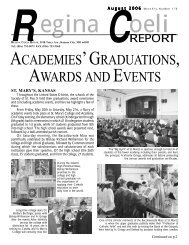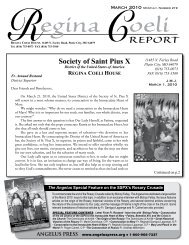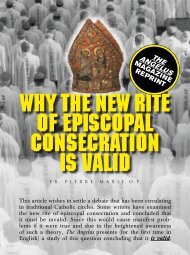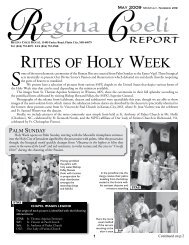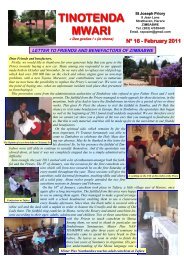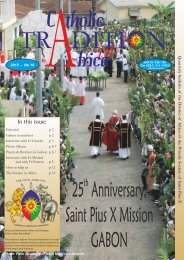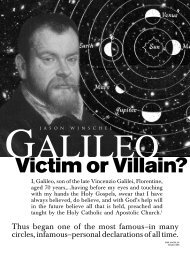Is Feeneyism Catholic? - Society of St. Pius X
Is Feeneyism Catholic? - Society of St. Pius X
Is Feeneyism Catholic? - Society of St. Pius X
Create successful ePaper yourself
Turn your PDF publications into a flip-book with our unique Google optimized e-Paper software.
T HE TEACHING OF THE CHURCH 75<br />
Ad 1: As it is written (I Kgs. 16:7), “man seeth those things<br />
that appear, but the Lord beholdeth the heart.” Now a man who<br />
desires to be “born again <strong>of</strong> water and the Holy Ghost” by Baptism,<br />
is regenerated in heart though not in body. Thus the Apostle<br />
says (Rm. 2:29) that “the circumcision is that <strong>of</strong> the heart, in<br />
the spirit, not in the letter; whose praise is not <strong>of</strong> men but <strong>of</strong><br />
God.”<br />
Ad 2: No man obtains eternal life unless he be free from all<br />
guilt and debt <strong>of</strong> punishment. Now this plenary absolution is<br />
given when a man receives Baptism, or suffers martyrdom: for<br />
which reason is it stated that martyrdom “contains all the sacramental<br />
virtue <strong>of</strong> Baptism,” i.e., as to the full deliverance from<br />
guilt and punishment. Suppose, therefore, a catechumen to have<br />
the desire for Baptism (else he could not be said to die in his<br />
good works, which cannot be without “faith that worketh by<br />
charity”), such a one, were he to die, would not forthwith come<br />
to eternal life, but would suffer punishment for his past sins [in<br />
Purgatory], “but he himself shall be saved, yet so as by fire” as is<br />
stated in I Cor. 3:15.<br />
Ad 3: The sacrament <strong>of</strong> Baptism is said to be necessary for<br />
salvation in so far as man cannot be saved without, at least, Baptism<br />
<strong>of</strong> desire; “which, with God, counts for the deed” (Augustine,<br />
Enarr. in Ps. 57). 103<br />
Thus the Church has not changed its doctrine one iota from<br />
that <strong>of</strong> <strong>St</strong>. Thomas, which is clearly based on the Scriptures and<br />
the Fathers <strong>of</strong> the Church.<br />
ST. ROBERT BELLARMINE<br />
Though their teaching encompasses <strong>of</strong>ten the whole <strong>of</strong> <strong>Catholic</strong><br />
doctrine, each Doctor <strong>of</strong> the Church has somehow his “specialty,”<br />
for instance, <strong>St</strong>. Alphonsus is renowned for moral theology,<br />
<strong>St</strong>. Augustine for grace, <strong>St</strong>. Bernard for Our Lady, etc. <strong>St</strong>.<br />
Robert is renowned for his treatise on the Church. So his teaching<br />
on the question merits particular attention. In his masterpiece on<br />
the Church, he defines the Church thus:<br />
Our definition is: there is only one Church, not two, and this<br />
one and true Church is the congregation <strong>of</strong> men bound together<br />
103 <strong>St</strong>. Thomas here explains what kind <strong>of</strong> necessity is that <strong>of</strong> the exterior<br />
sacrament: a necessity re aut voto–in fact or in desire, as will be defined later<br />
by the Council <strong>of</strong> Trent in general for all sacraments.



